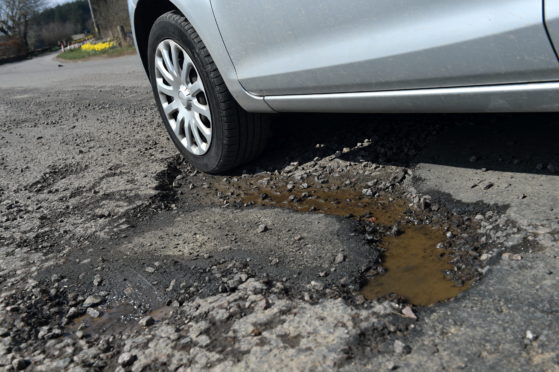A risk-based approach to pothole repairs in Fife is to be adopted in a bid to eat into the region’s extraordinary £77.6 million roads maintenance backlog.
The details have emerged in new reports to Fife Council’s economy, tourism, strategic planning and transportation committee, with the new policy aiming to free up resources that would allow many temporary repairs to be replaced by much more durable solutions.
Currently the local authority aims to treat all ‘safety defects’ within one day or five days, but officials have conceded those targets have proved challenging, particularly in the winter when more dangerous defects may be delayed due to the need to repair lower-risk problems.
Councillors have been warned that resources are at real risk of being “overwhelmed” in the event of extreme weather due to the volume of repairs required, which in turn can compromise the quality of repairs to avoid backlogs.
To address this, the new policy will come into effect in April 2020, although the size of the task facing the local authority has been laid bare in a separate committee report which confirmed the region’s road network condition is likely to worsen in the medium to long-term.
Senior manager Derek Crowe highlighted the challenges faced by workers and noted there will be a lower average annual capital budget available for roads maintenance over the next five years than what was spent over the last five years.
“Performance in dealing with repair timescales over the last year was impacted by a large backlog from a major weather event and this has highlighted the pressure on both budgets and resources to meet the challenging timescale targets,” he said.
“Especially in winter, the potholes become craters very, very quickly, so we do need to be there quickly and do a quality repair, first and permanent.
“It is anticipated that the new risk-based approach to road maintenance will bring forward several benefits that will assist with the road maintenance service challenges going forward.”
With that in mind, councillors have also considered the outcome of the 2017-19 Scottish Road Maintenance Condition Survey which showed a deterioration in the condition of A, B and C class roads throughout Fife, and a slight improvement in the condition of unclassified roads.
With Fife’s estimated maintenance backlog standing at £77.6 million, Mr Crowe pointed out that a budget of around £12 million would be required to retain a “steady state” in Fife’s road condition.
However, while the average annual investment over the past five years has stood at £7.6 million, current estimates suggest the average annual budget between now and 2023/24 will fall well short of that – somewhere around £5.43 million.
“Given the linkage between funding and Road Condition Indicators (RCI), the Fife road network condition is likely to deteriorate in the medium to long term,” he acknowledged.
The new risk-based approach could save around £120,000 a year, it is thought.










